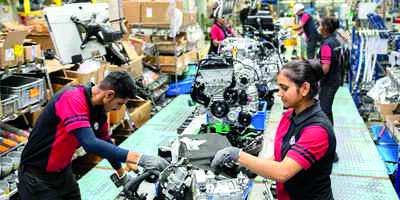Women transform the manufacturing sector
Let’s celebrate the women who are breaking into the male bastion of manufacturing and influencing its growth

Despite challenges, women are increasingly leading and innovating in India’s manufacturing industry, showcasing remarkable resilience and skill. (Image by arrangement)
No doubt women have been doing wonders in all fields of work, but it is still surprising that they’re making a mark in a long-term male-dominated area in India — the manufacturing industry. Women reportedly constitute 20% of employees in this sector. A Ques Corp survey highlights a remarkable uptick in the number of women in the manufacturing industry, with sectors like automobiles, phone manufacturing, etc. opening their floors to women.
Well, working in manufacturing is no piece of cake. It calls for long hours, late night shifts, being exposed to very hot temperatures, and undertaking physically demanding labour. Let’s give a shout-out to the courage of women in the manufacturing industry.
Hailing from Punjab, Harpreet Kaur has completed her diploma in electronics and communication engineering and is working at an auto manufacturing unit in Gujarat. She is only one of the women who are leading by example in the manufacturing industry.
Women excel as machine operators and assembly-line workers, ensuring efficient production and quality control. In engineering and design, they contribute as process engineers and product designers, optimizing processes and developing innovations.
Gayatri, hailing from Godhra, has been working at MG Motors India, Gujarat, for over five years. She is India’s first female manual painter in the auto industry. She shared that she came to MG with no experience. However, she is now trained to handle all the stations in her field. “As women, we face many challenges in this industry but we have realized that gender has no bearing, we are all equally equipped to work in manufacturing,” she says.
Javelin Solanki broke traditional barriers to work in the manufacturing industry. She is the first woman in her family to do so! “My in-laws were very supportive of me working in manufacturing and it gave me even more courage to rise and shine. I am no more afraid to work for long hours in a manufacturing unit,” she shares.
Women also function as plant managers and team leads, in supply chain management and as safety officers. Their involvement in Research and Development drives technological advancements, and in human resources, they lead workforce training and development, enhancing the industry’s growth and diversity.
Be it Vinita Bali who has led Britannia Industries for a long time or Suchi Mukherjee, the founder of Limeroad, women have been showing immense leadership qualities in the manufacturing industry and have built strong foundations for their businesses.
Revathi Roy, founder and CEO of Hey Deedee, focuses on training women in logistics and e-commerce supply chain management, including in manufacturing roles. She is building a bank of skilled women in the manufacturing and logistics industries.
Ridhima Kansal, Director, Roosemoore, a brand dedicated to creating luxurious lifestyle fragrance products, shares, “Each of the fragrances we create carries the essence of our journey to reach this point. Manufacturing has been challenging, demanding, and enjoyable. It’s a space where it’s all about accuracy, imagination, and constant evolution. Being a woman in the sector, I have managed to handle the adversity and overcome it in great ways. There is so much satisfaction in knowing that the products that we make have become a part of people’s daily lives elevating their homes and surroundings and upgrading their lifestyle.”
Hiral Mehta, Director of SPARTAN Engineering Industries Pvt. Ltd., says, “While there has been notable progress in the representation of women in engineering, significant challenges persist. Nevertheless, their distinct viewpoints and innovations influence a wide array of products, from everyday household items to advanced technological solutions.”
She adds, “Celebration of Engineers’ Day plays a vital role in evaluating existing norms and promoting a more inclusive environment for women in engineering organizations. It serves as a compelling reminder of achievements and areas that require further attention. It helps us motivate the upcoming generation of female engineers, fostering a more diverse workforce and paving the way for innovative solutions to global issues.”
Women in manufacturing face several challenges, including gender stereotyping, limiting their participation and growth. Workplace culture can often be isolating, with fewer mentorship opportunities and strong bias against women in leadership roles. The sector’s demanding work schedules create challenges for work-life balance, especially for women with care-giving responsibilities. Wage disparity persists, with women often earning less than men for similar roles. Additionally, limited access to training and career development programmes hinders advancement, while workplace safety measures may not always take gender-specific needs into account, further complicating their experience in the field.
Women who enter the field of manufacturing despite these challenges need to be applauded. Kudos!
( Source : Deccan Chronicle )
Next Story

